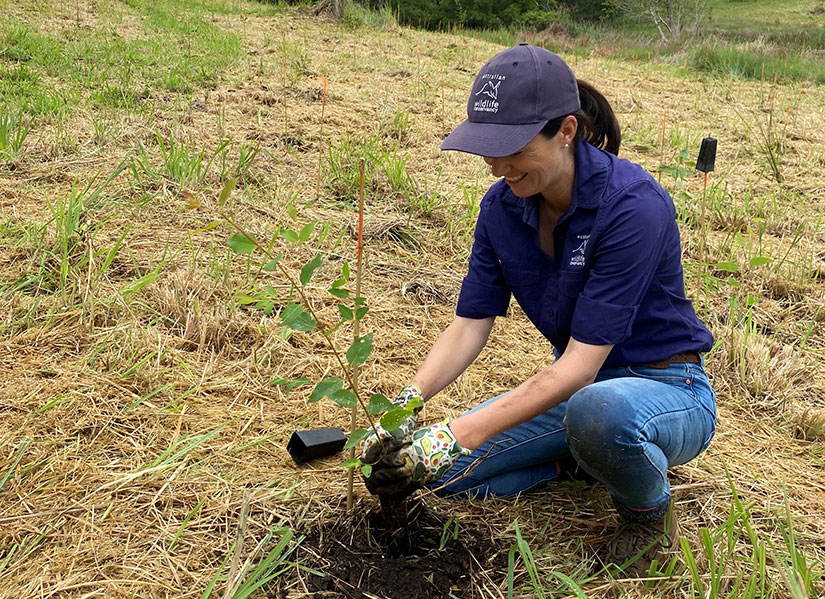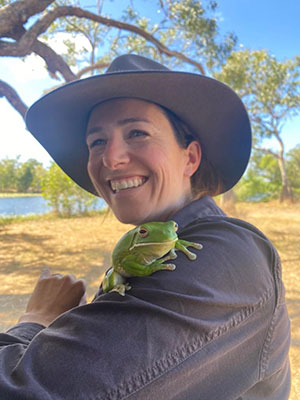
Kim Hellberg, 26 March, 2024
In this Q&A with Genevieve Deaconos, the QUT alumnus and nature-enthusiast elaborates on her transition from a career in corporate marketing to her dream job at the Australian Wildlife Conservancy (AWC) and the profound benefits of connecting with nature for individual and generational wellbeing.
Speaking from personal experience as a mum-of-two who found time spent in nature equated to a more balanced and energised lifestyle with her family, Genevieve underscores the importance of fostering a deeper appreciation for nature in urban environments and nurturing the next generation of conservationists. In addition to her role as Development Manager at the AWC, she is also a board member of Co-Exist Australia, a small not-for-profit offering young people opportunities to connect, socialise, and make a positive impact on their local environment.
Can you share with us your journey from studying Creative Industries and Business at QUT to working with the Australian Wildlife Conservancy?
I came from a small country town to study at QUT right after high school. I spent around fifteen years in corporate marketing roles, pursuing additional studies while working on some great brands with talented teams. But eventually I wanted to find some way to combine my love of nature with my work.
A fellow QUT alum, Danielle Duell, gave me a values-mapping exercise and urged me to outline my 'dream job.' When the position of Development Manager at the Australian Wildlife Conservancy (AWC) arose, I compared it to my dream job checklist…and it ticked every one of my boxes!
Now, I’ve been lucky enough to work at AWC in my dream job for just over two years and I’m absolutely loving it.
How do you integrate your background in Creative Industries and Business into your current role in conservation efforts?
My degrees gave me practical, transferable skills that have served me well across multiple industries. At AWC, I rely on skills like relationship management, pitching, and crafting proposals, all gained throughout my Marketing studies and career. A background in Creative Industries also comes in handy, especially for presenting and writing.
Last year, I joined the board of Co-Exist Australia, a small not-for-profit bringing together communities of young people and offering them opportunities to connect, socialise, and make a positive impact on their local environment. Strategic planning, risk management and communication skills from my Masters degree have been invaluable in this role, and it is really exciting to be able to play a small part in helping the organisation grow.
What are some of the projects you've been involved with at the Australian Wildlife Conservancy?
At AWC I’ve raised critical funds to help save the Northern Bettong and the Northern Hairy-nosed Wombat from imminent extinction; helped volunteers plant more than 3,500 koala food trees at an AWC sanctuary on the Sunshine Coast and collaborated on an education program for children aged 3-5 years with Affinity Education Group, designed to raise awareness of our native species and conservation. Never a dull day!
How do you believe embracing nature contributes to individual wellbeing?
There are clear associations between nature exposure and improved cognitive function, healthier blood pressure, better sleep, and positive mental health outcomes. Research shows that being in forests or around trees can boost the body's immune response, making us more resistant to disease. Access to nature has also been linked with improved mental wellbeing and cognitive development in children, and lower psychological distress in teens.
The concept that nature is good for you is not a 'woo-woo' theory or an esoteric belief: it is scientific evidence. What would you pay for a pill that would reduce your risk of disease, make you smarter, help you sleep better and improve your mental health? All those benefits are available for free, in nature.
 Genevieve planting trees at AWC's Curramore Wildlife Sanctuary
Genevieve planting trees at AWC's Curramore Wildlife Sanctuary
In what ways do outdoor activities positively impact people's mental health?
There are so many ways it seems nature was designed to be good for us. Did you know that digging in the dirt releases microbes in the soil - specifically, a soil bacteria called mycobacterium vaccae? Inhaling these microbes can stimulate serotonin production, which makes you feel more relaxed and happier, affecting the brain in a similar way to antidepressants. Gardening literally makes you happier.
Research has shown that individuals living in areas with a higher density of trees exhibit lower rates of depression, anxiety, and stress than those with fewer trees. Nature has also been found to have a positive impact on children who have been diagnosed with impulsivity, hyperactivity, and attention deficit disorder. There is no doubt that time outside is essential for our mental health.
Could you share any personal experiences where connecting with nature has brought about a significant change in your life?
When my two children were small, and I went back to work full time, I experienced a period of burnout. The constant stress and lack of sleep began to manifest as anxiety, recurrent illness, and depression. Too foggy and distressed to really know what to do, I made a simple commitment to spend at least two hours every week in nature. Within a few weeks I was feeling calmer and more focused, enabling me to make the other positive changes I needed to make to my lifestyle. That decision had a massive impact on my life and my family.
How can we encourage more people, especially in urban environments, to engage with nature for their wellbeing?
Nature is everywhere. We need to stop thinking about nature as this pristine, remote wilderness. It can be that, but more often it is your nature strip, your local park, the plants on your balcony or the birds that visit your local café. All we really need to do is look up from our phones and spend a few moments noticing nature, wherever we find it. That’s a great start.
How does your work intersect with the concept of generational wellbeing, particularly in terms of preserving natural habitats and wildlife for future generations?
Having children has made me incredibly aware of what kind of world they will inherit when I’m gone. I do not want to tell my kids that there used to be animals called koalas and quolls and numbats when they were little, but now they’re extinct. That would be devastating. They know I work at AWC to help prevent this from happening.
Our children are entitled to inherit a healthy, biodiverse planet. But we have mucked it up pretty badly so far. We need their help. Organisations like Co-Exist Australia are empowering young people to lead their own conservation efforts, and AWC’s educational programs are teaching the next generation about the importance of biodiversity and conservation. Starting the conversation early is so important. In the words of environmentalist Baba Dioum: “In the end we will conserve only what we love. We will love only what we understand.”
 Tell us the best thing about your job!
Tell us the best thing about your job!
At AWC I have the privilege of collaborating with some amazing supporters who share our passion and have the means to assist. I get to meet some truly wonderful people.
What are your hopes for the future of conservation?
One day in the not-too-distant future, I hope people will come to better understand how interconnected we all are – trees and insects and animals and people. The health of each of us depends on the others. Once we really start to understand that connection, how could we so easily destroy the very thing that keeps us alive and healthy? Surely that will have to change. I think it’s already changing; it just needs to happen a bit faster!
Genevieve Deaconos
QUT degrees - Bachelor of Creative Industries (Drama) (2003) and Master of Business (Marketing) (2016)
Have a question for Genevieve? Connect with her on LinkedIn.
